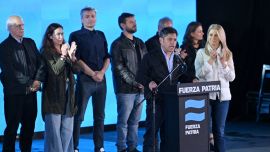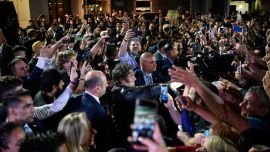His surname conjures images of ice cream, but Emilio Pérsico – the leader of Movimiento Evita social and political grouping – renounced the family inheritance many years ago. The decision was a move to show consistency with his picketer lifestyle and he went to live in a shantytown. This is not a minor detail, because the house in Isidro Casanova in the heart of La Matanza where he received Noticias – despite being averse to interviews – was constructed as a hideout for the Montonero leader Mario Firmenich, with whom Pérsico concurred politically.
He decided to speak out after his piquetero organisation, one of the biggest, became the target of public darts from Vice-President Cristina Fernández de Kirchner, who raised suspicions regarding the use of social plans, referring to the Movimiento Evita without mentioning it specifically. Because Pérsico not only occupies a post in the Social Development Ministry and manages this important political fund (which implies being on both sides of the “counter”) but has also become the territorial support of President Alberto Fernández. And that is a fact that Cristina does not forgive.
The story of the lord of the plans is little-known but sounds fascinating. From a Montonero and founder of the Movimiento Patriótico Revolucionario Quebracho to a pragmatic leader criticised by La Cámpora for having sat down to negotiate with the Mauricio Macri government. From greengrocer and metal worker to public official. From having a calling to the priesthood to becoming an inveterate political militant.
The man with the white beard is not easy to pigeonhole to the point that he himself admits that the plans don’t work.
“The subsidies and plans make society sick,” the 73-year-old admits.
His story
The picket-leader likes to talk about himself because practically all the decisions he took in life can be explained by some conviction he had at that time. Emilio Pérsico dreamed of becoming a priest but at the age of 14 he began his student militancy in La Plata. As from that moment, everything was intense.
Parallel to his entry into politics, he took two decisions which marked his life – he left his family home and asked his father, an important La Plata engineer, to help him to get a job in a factory: “He knew all the industrialists and replied to me that I was mad: ‘They all know who you are. Do you think they are going to take you so that you can set up a trade union? I cannot recommend that they take you because you’re going to kick up a fuss,’ he told me. But in the end he relented and presented me to a friend and I entered a metal factory,” he narrates.
This was not the only striking decision of his adolescence.
“We were out of our skulls. If today a child of mine would do anything like that, I’d kill them. For example, one generally begins militancy in the third grade [of secondary school] because you only had two years ahead. Since fifth grade cannot be repeated, we passed through fourth grade twice just in order to be political,” he laughs.
His first brush with death was in his adolescence. He had gone with a group of comrades to receive Juan Domingo Perón at Ezeiza airport and a friend of his took a gunshot in the head. Pérsico says that he was always “serious” about politics, even as an adolescent. In fact he always knew how to penetrate the establishment – when Héctor Cámpora became president in 1973, Pérsico remembers kicking around a ball in the patio of Buenos Aires Province government house while debating with officials and comrades.
But when the coup came, he had to go into exile. He was then 19 and already had a daughter with his first wife, Cecilia Calcaño. When they left Argentina, she was already pregnant again. Their second daughter was born abroad and the couple decided to leave their girls in a Cuban nursery.
“It had to be done because you could lose your children. We knew that the military would not hand them over. Somehow it was a way of protecting them,” he recalls.
Calcaño intended to return to Cuba two years afterwards to look for them but he couldn’t, continuing in exile. The only photo he has from those times, when he had still not let his characteristic beard grow, was taken in Brazil, showing a young Pérsico in a white shirt staring at the camera with mountains in the background.
“I took it to send it to my daughter so that she could see my face at least once,” he says.
Pérsico spent part of his exile in Sweden where a fellow-militant told him that he needed instruction.
“I wasn’t an intellectual, I was a bit rough so they took me to see Rodolfo Puiggrós. I couldn’t believe it. I was told to go every day to his house and that he would give me a book and we would discuss it. The first day I went there thinking that he would give me history textbooks but it turned out to be the complete works of Pablo Neruda. Afterwards he gave me Capitanes de la arena by Jorge Amado. I found it hard to understand what that would contribute but it was tremendous,” he recalls.
Pérsico is a man who enjoys conversation and he has a very good sense of humour but there is just one subject he dodges – the violence of the 1970s.
“We shouldn’t talk about that, it makes no sense. History will evaluate that moment and we have not yet reached that stage. There is vindication of the heroism and there are also very critical positions … and the truth is that there are very good people who take a very bad view of that process and I do not want to fight with them. Even ‘Chino’ [Fernando Navarro] is very much against the Counter-offensive,” he responds.
Pérsico formed part of the Counter-offensive of the Montoneros, one of their most controversial initiatives. In his case he installed himself upon arrival in the Iparraguirre neighbourhood of Grand Bourg in the northern suburbs of Greater Buenos Aires.
“We had to walk through 40 muddy blocks to reach the station. I went to work in a metal factory to organise Peronism. It was risky because we were clandestine. Indeed the friend accompanying me there went missing,” he recounts.
It was in Iparraguirre where he met his second wife, Isabel Palomo, with whom he stayed for 27 years. That woman’s story is incredible.
“She was a very humble comrade from Chaco. One day her father killed her mother in an accident but he was so drunk that he could not save her. They lived in the middle of the jungle, 40 kilometres away from any asphalt road and from there you had to go 80 kilometres to reach a town. She saddled a horse and set out for Buenos Aires. When the horse died on her, she hitchhiked until reaching, as fate would have it, the shantytown where I was,” he relates.
Life with Isabel was extremely precarious. During the first five years of their relationship she worked as a live-in housemaid and they only saw each other at weekends in a hut which they shared with another friend. And although she managed to construct a good relationship with her children, her economic circumstances were a lifelong motive of reproach.
He took charge and says, all the time, that he was a bad father. He had the possibility of giving his children a good life but he had renounced the family inheritance. His paternal grandfather had founded the Pérsico ice cream parlour chain in La Plata and his father, the engineer, had increased the family assets with downtown shops and farmland. Although not from an aristocratic family, they ended up becoming part of the upper classes of those times. He did not want to use any of that to maintain his family and even renounced his rights as heir. “We were four brothers. Only two were left to inherit but they quarrelled and litigated between themselves. That’s what happens with money. My children in any case decided to join the battle for the succession. I did not give them a good life. I brought them up to be humble by conviction but they grew up in very violent slums and some of them had all the accompanying vices. One of them was into drugs in a very bad way … cocaine, paco, he consumed anything which came along,” he laments.
Transformation
There arrived a moment when Pérsico decided that factories were no longer the place to be. He moved to Colonia Urquiza on the outskirts of La Plata where he dedicated himself to farming. From there his organising activities started to be increasingly on the fringe of politics. The Peronism proposed by Carlos Menem never seduced him and he began linking up with other movements of the unemployed. He inculcated just one idea into his children: “This system does not save everybody.”
That organising peaked with the demonstrations of 2001 and over the years he became the face of a totally novel phenomenon in Argentina – the piquetero movement. He was one of the founders of Movimiento Patriótico Revolucionario Quebracho, which installed roadblocks as a method of protest. Of that organisation of hooded demonstrators brandishing sticks, which was questioned at the time for its violent methods, he says: “It was a breath of fresh air” after the difficult years under Menem.
When Néstor Kirchner reached power, Pérsico mistrusted him. Yet he had hardly got to know him when he decided to assemble his family “to tell them that I wasn’t going to work any more, that I was going to dedicate all my efforts to backing this guy and that I would be dropping farming apart from renting a small plot of land to support myself.”
Perhaps without knowing it, that day began a new chapter in his life which also included a transformation at a private level. In 2005 he got to know Patricia Cubría – senator Juliana Di Tullio was the matchmaker.
He invited Patricia, likewise a militant, to live in a shantytown called ‘Amor y corazón’ (“Love and heart”) in San Fernando. She said yes at once.
“The relationship with the family of ‘la Colo [“redhead]’ was difficult at first. Firstly, there was the age difference – she was only 24 when we got to know each other. But afterwards, when we moved into a corridor, her mother couldn’t believe it. She’s a progressive woman, yes, but it’s quite another thing when your daughter goes to live in a place smelling of shit where people kill each other for the slightest reason,” he adds.
In 2006 he founded Movimiento Evita while, in parallel, he became an official enjoying the confidence of Buenos Aires Province governor Felipe Solá. That transformation separated him forever from the leftist organisations, who maintained their opposition to the Kirchnerite government.
“What happened is that I was always a Peronist and we Peronists were always waiting for somebody to open the doors of the state to transform reality,” he explains.
His power, influence and visibility leaped forward from that moment, while his name and face remained associated with two words: social plans. Little by little Movimiento Evita became one of the biggest social organisations in the country with Pérsico boasting: “In every town we have a figure of reference.”
Money
Pérsico laughs and says that he is a “kept man.” According to him, ever since he met Patricia, she’s the one who’s been maintaining the family economically. Actually, his current salary is around 400,000 pesos, he says.
“I save and accumulate my salary until I can get to buy some property and when I do, I donate it to Movimiento Evita. My last donation to the organisation was land to set up a rehabilitation farm. I have to do it all at the end of the year and give it away before my next sworn declaration of assets because otherwise it would come out in all the newspapers that I have so much property when in reality, I did not buy it for myself,” he explains.
At times it is hard to understand when he is talking about his own assets or those of his organisation.
In the sworn declaration of Cubría there is also land in Mendoza and terrain in Tigre. In the former the couple produce wine via a cooperative whose authorities belong to Movimiento Evita under the brand name of Bowen, while the latter is in reality also in the process of being donated to the organisation, assures Pérsico.
When his adversaries talk about him, they repeat that he is one of the leaders with the most important funding. The government’s ‘Potenciar Trabajo’ scheme falls within the orbit of Movimiento Evita, a programme with an annual budget of 227.1 billion pesos. The other big question-mark is his current post of social economy secretary, thus making him the top figure of reference for his organisation.
“There is no contradiction. I only start the paperwork but the minister signs and it is he who decides to whom plans go and to whom not,” he defends himself.
He further insists that Movimiento Evita is the organisation which has grown the least during this government.
“When we arrived, we had 70,000 [people with] plans and now we have 120,000. The other organisations and the mayors have grown much more. I did not agree with so much increase and I told Alberto as much,” he adds.
Pérsico’s adversaries have their doubts about those numbers.
Diagnosis
Pérsico’s first meeting with Noticias has to be cancelled. “Tomorrow’s meal has been suspended because one of the comrades of Lafe[rrere] was shot up last night, that’s how things are around here…”, he wrote via WhatsApp. The leader had invited the magazine to a dinner with members of the Club Laferrere, whom he wished to thank for their assistance in organising the ‘90 minutos de libertad (90 minutes of freedom)’ championship, a programme promoted by Movimiento Evita on behalf of convicts in No. 43 penitentiary in González Catán. Nevertheless, the plan was frustrated when two hitmen tried to kill the leader of the club’s barra brava hooligans, who also belongs to Movimiento Evita. They opened fire on him in a shopping street at midday. The man was hit by four of the 40 shots fired at him and had to be hospitalised. “We’re never going to know where that attack came from,” says Pérsico.
For him this is nothing exceptional, maintaining that what happens in the Greater Buenos Aires underworld has nothing to do with what “progressives” in the Federal Capital imagine. His criticism is directed against ultra-Kirchnerites and La Cámpora above all.
“I lived in shantytowns throughout the entire government of Cristina and I’m thankful for that because otherwise I wouldn’t have understood how profound and serious this is. In my corridor four kids died, all shot dead. On the day I arrived a kid was selling paco at the door of my house,” he insists.
He slots Cristina among the progressives, saying they’re disconnected from reality. Alberto understands a bit better, he says.
"I can make myself understood with the organisations and with businessmen. Politicians do not live on this planet but businessmen do," he assures, going beyond that to say that labour reform is practically inevitable and the only thing to be resolved is whether it should benefit the humble or businessmen.
Nevertheless, among the business universe he has cultivated very good links with soy tycoon Gustavo Grobocopatel and the authorities of Mastellone dairy company, two of his mentions. With the help of Argentum he is designing a site like Mercado Libre for the popular economy and he wants to make deals so that his textile co-operatives can sell to supermarkets like Carrefour. He also speaks of the IDEA business symposium as a sphere in which he can make himself understood.
Pérsico came out to talk because he wants to form a party to compete in the PASO primaries. His unusual life story suggests that he might end up with the least expected allies. Who knows?


























Comments